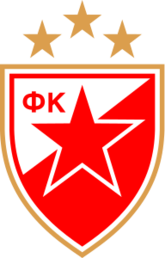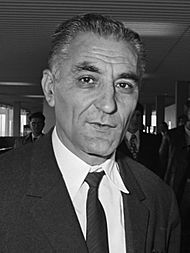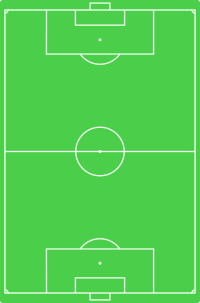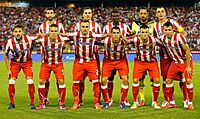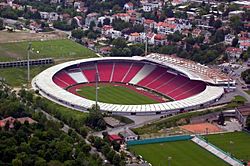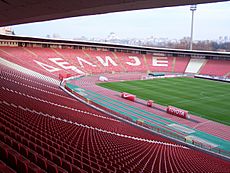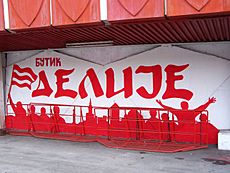Red Star Belgrade facts for kids
Fudbalski klub Crvena zvezda (which means "Red Star Football Club") is a professional football club from Belgrade, Serbia. It is often called Crvena zvezda or Red Star Belgrade in English-speaking countries. The club is a big part of the Red Star multi-sport society.
Red Star is known as the most successful football club in the Balkans and Southeast Europe. They are the only club from this region to have won both the European Cup and the Intercontinental Cup, achieving this in 1991. They were also the second team from Eastern Europe to win the European Cup.
The club has won many titles in Serbia and former Yugoslavia. They have 36 national championships, 29 national cups, and several other national trophies. This makes them the most successful club in Serbia and in the history of Yugoslav football.
Red Star Belgrade is the most popular football club in Serbia. About 48% of people in Serbia support them. They also have many fans in other countries that were once part of Yugoslavia, and among Serbians living abroad. Their biggest rivals are Partizan, another club from Belgrade. Matches between these two teams are called the Eternal derby.
The International Federation of Football History & Statistics ranked Red Star as the highest-ranked Serbian and Balkan club of the 20th century, placing them 27th in Europe.
Contents
Club History and Achievements
Early Years and First Triumphs
Red Star Belgrade was formed on March 4, 1945, by a group of young players and students. This happened after many older Serbian clubs were closed down. The name "Red Star" was chosen after a lot of discussion. Other ideas included "People's Star" and "Blue Star."
The club quickly became a symbol of Serbian pride. On the day it was founded, Red Star played its first football match and won 3-0. In its first 15 years, Red Star won six Yugoslav championships and five Yugoslav Cups. They also reached the semi-finals of the 1956–57 European Cup.
Some famous players from this time were Rajko Mitić, Vladimir Beara, and Bora Kostić. In the 1957–58 European Cup, Red Star played against Manchester United. Manchester United won the match, but sadly, their plane crashed in Munich the next day, killing many players. This event is known as the Munich air disaster.
Growing Success in Europe
Under coach Miljan Miljanić, Red Star won more Yugoslav championships and cups. They also reached the semi-finals of the 1970–71 European Cup. Players like Dragan Džajić and Jovan Aćimović became stars. Red Star even beat famous teams like Liverpool and Real Madrid in European competitions.
In 1979, Red Star reached the UEFA Cup final for the first time. They played against Borussia Mönchengladbach. Red Star lost 2-1 over two matches, but it was a great achievement to reach the final.
Later, in a match against Barcelona in 1982, Barcelona's Diego Maradona scored an amazing goal. Even the loyal Red Star fans applauded him because the goal was so incredible!
The Golden Era: European Champions
From 1986 to 1992, Red Star had its most successful period. The club's leaders, Dragan Džajić and Vladimir Cvetković, built a very strong team. They signed talented young players like Dragan Stojković. The club even made a five-year plan to win the European Cup.
This plan worked! In 1991, Red Star won the 1991 European Cup Final in Bari, Italy. They played against Marseille. The game was very defensive and ended 0-0 after extra time. Red Star won the match 5-3 in a penalty shootout, with Darko Pančev scoring the winning penalty. This was the first time a club from Yugoslavia won the European Cup!
Red Star also won the 1991 Intercontinental Cup in Tokyo that year, becoming world champions. They were unbeaten in both tournaments.
Challenges and Recent Success
After 1992, the club faced many challenges. Many star players left, and wars in former Yugoslavia meant Red Star had to play home games in other countries. This made it harder to defend their titles. The United Nations also placed sanctions on Yugoslavia, which affected football.
Despite these difficulties, Red Star still won five national cups between 1992 and 2000. They also had some great European matches, like against Barcelona in 1996.
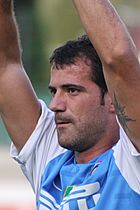
After the NATO bombing of Yugoslavia ended, Red Star won their 17th cup in 1999. They returned to the European spotlight in 2001, reaching the qualifying rounds of the UEFA Champions League.
In the 2013–14 season, Red Star won their 26th league title after a six-year wait. However, due to financial problems, they were not allowed to play in the 2014–15 UEFA Champions League that year.
Red Star made a big comeback in European competitions. They qualified for the 2017–18 UEFA Europa League group stage and reached the knockout stage, which was a first for a team starting from the first qualifying round.
In 2018, Red Star qualified for the UEFA Champions League group stage for the first time since the new format was introduced. They even became the first Serbian team to win a match in the Champions League when they defeated Liverpool.
On May 14, 2019, the 1946 People's Republic of Serbia League title was officially recognized. This meant Red Star's win in the 2018–19 Serbian SuperLiga was their 30th national championship! Red Star also reached the UEFA Champions League group stage for the second year in a row.
In the 2020–21 Serbian SuperLiga, Red Star set a world record by earning 108 points in a single season. They continued their winning streak, completing their fifth consecutive "double" (winning both the league and cup) in the 2024–25 season.
Club Colors and Crest
|
|
| Red Star adopted the iconic red and white vertical stripe jersey in 1950. |
Red Star first wore yellow shirts with a red star. In 1946, they changed to red shirts with white shorts. By 1950, they adopted their famous red and white vertical striped shirts. These stripes are now a key part of Red Star's look, giving them the nickname Crveno-beli, meaning "the red and white's" in Serbian.
The club's crest features a red five-pointed star with a white outline, set on a red and white background. The whole crest is framed in gold. There are three golden stars above the emblem, which represent the 30 national titles the club has won.
The "red star" symbol, from which the club gets its name, has become a strong symbol for the club itself and for Serbian national identity. It shows the club's popularity and success in sports.
Home Stadium: The Marakana
Red Star's home stadium is the Rajko Mitić Stadium. It was renamed in honor of Red Star legend Rajko Mitić on December 21, 2014. Before that, it was known as Red Star Stadium.
With seats for 51,755 fans, it is the largest stadium in Serbia and in the former Yugoslavia. It opened in 1963. Because it was so big (it used to hold about 110,000 people), it was unofficially called "Marakana," after the famous Maracanã Stadium in Brazil. Belgrade's Marakana became known as a very tough place for visiting teams to play.
Many big football events have been held here. These include the European Cup final in 1973 and the UEFA European Championship final in 1976. In the mid-1990s, standing areas were replaced with seats to make the stadium safer and more comfortable for fans.
The stadium has been modernized over the years. In 2008, the pitch was rebuilt with under-soil heating and new grass. In 2011, a new LED scoreboard was added. Today, the stadium has special VIP lounges and a modern press area. There is also an official Red Star shop and a Delije (fan group) shop. The playing field is 110 by 73 meters and is lit by powerful floodlights.
The "Marakana" is considered one of the top 50 football stadiums in Europe. In 2012, Bleacher Report called it one of the most intimidating stadiums in the world when it's full of fans.
Youth Academy: Developing Future Stars
Red Star's youth academy is very important for the club. It has helped develop many talented players who went on to become famous.
Some of the most well-known players who came from Red Star's youth system include Dragan Džajić, who was named the best Serbian player of all time. Others include Dragoslav Šekularac, Vladimir Petrović, Vladimir Jugović, Dejan Stanković, and Nemanja Vidić. These players achieved great success both with Red Star and other top clubs around the world.
The academy continues to train young players, helping them become the next generation of football stars.
Passionate Supporters: The Delije
Red Star is the most popular football club in Serbia. They have fans all over the country and among Serbians living abroad. This makes the club a symbol of Serbian identity.
The organized fan groups of Red Star are called Delije. This word roughly means "Heroes" or "Braves" in Serbian. The Delije support all parts of the Red Star multi-sport society. They are known worldwide for their passion and strong support.
Hardcore fan groups started forming in the 1980s, and the Delije officially came together in 1989. They are known for their amazing displays, using flares, flags, banners, and loud cheering. The word "Delije" is even written in Cyrillic on the north stand seats of the Rajko Mitić Stadium, showing the strong bond between the club and its fans.
The Delije have strong friendships with other fan groups, especially Olympiacos ultras Gate 7 from Greece. This friendship is based on their shared Eastern Orthodox faith and cultural ties. They also have a bond with Spartak Moscow ultras Fratria, due to shared Slavic heritage.
The Eternal Derby: A Fierce Rivalry
Red Star's biggest rival is FK Partizan, another major football club from Belgrade. Their rivalry began right after both clubs were created in 1945. Since then, they have been the top two clubs in Serbian football.
The matches between them are famous for the incredible passion of the fans. Red Star's supporters are the Delije, and Partizan's fans are called the Grobari (meaning "Gravediggers"). Both sets of fans create amazing atmospheres with fireworks, confetti, flags, and loud songs. The stadiums are known to "bounce" with the fans jumping together.
This rivalry is considered one of the greatest in the world. Matches between Red Star and Partizan are called the Eternal derby. They are known as some of the most intense rivalries in European football. The largest crowd for a Red Star – Partizan match was about 108,000 spectators at the Rajko Mitić Stadium.
Club Honours and Trophies
Red Star has won 4 international and 70 domestic trophies, making them the most successful football club in Serbia and former Yugoslavia.
Domestic Competitions (70)
National Championships – 36 (record)
- People's Republic of Serbia League (record)
- Winners (1): 1946
- Yugoslav First League (record)
- Winners (19): 1951, 1952–53, 1955–56, 1956–57, 1958–59, 1959–60, 1963–64, 1967–68, 1968–69, 1969–70, 1972–73, 1976–77, 1979–80, 1980–81, 1983–84, 1987–88, 1989–90, 1990–91, 1991–92
- First League of Serbia and Montenegro
- Winners (5): 1994–95, 1999–2000, 2000–01, 2003–04, 2005–06
- Serbian SuperLiga (record)
- Winners (11): 2006–07, 2013–14, 2015–16, 2017–18, 2018–19, 2019–20, 2020–21, 2021–22, 2022–23, 2023–24, 2024–25
National Cups – 29 (record)
- Yugoslav Cup (record)
- Winners (12): 1948, 1949, 1950, 1957–58, 1958–59, 1963–64, 1967–68, 1969–70, 1970–71, 1981–82, 1984–85, 1989–90
- Serbia and Montenegro Cup (record)
- Winners (9): 1992–93, 1994–95, 1995–96, 1996–97, 1998–99, 1999–2000, 2001–02, 2003–04, 2005–06
- Serbian Cup (record)
- Winners (8): 2006–07, 2009–10, 2011–12, 2020–21, 2021–22, 2022–23, 2023–24, 2024–25
National Super Cups – 2 (record)
- Yugoslav Super Cup
- Winners (2): 1969, 1971
National League Cup – 1 (shared record)
- Yugoslav League Cup
- Winners (1): 1972–73
National Champions League – 2 (record)
- Yugoslav Summer Champions League
- Winners (2): 1971, 1973
International Competitions (4)
Red Star is the most successful club from Serbia (and former Yugoslavia) in European competitions. They are the only club from Eastern Europe to have won both the European Cup and the Intercontinental Cup. On October 27, 2017, FIFA officially recognized all winners of the Intercontinental Cup as club world champions.
- European Cup / UEFA Champions League
- Winners (1): 1990–91
- Intercontinental Cup
- Winners (1): 1991
- UEFA Cup / UEFA Europa League
- Runners-up (1): 1978–79
- UEFA Super Cup
- Runners-up (1): 1991
- Mitropa Cup
- Winners (2): 1958, 1967–68
Friendly Tournaments (21)
- Torneo Internacional de Chile (1): 1962
- Tournoi de Paris (1): 1962
- Trofeo Ibérico (1): 1971
- Teresa Herrera Trophy (1): 1971
- Trofeo Costa del Sol (1): 1973
- Orange Trophy (1): 1973
- Danube Tournament (1): 1976
- World of Soccer Cup (1): 1977
- Lunar New Year Cup (1): 1980
- Belgrade Tournament (2): 1980, 1981
- Trofeo Costa Verde (1): 1982
- YU Tournament (1): 1984
- Mostar Tournament (1): 1991
- Torneo di Verona (1): 1991
- Tournoi de Corse (1): 1995
- Freiburg Tournament (1): 1997
- IFiZ Leipzig (1): 2004
- Chicago Sister Cities International Cup (1): 2010
- PARI Premier Cup (1): 2023
- Winline Summer Cup (1): 2024
Club Records and Famous Players
Dragan Džajić holds the record for most appearances for Red Star, playing 389 matches. The top goal scorer is Bora Kostić with 230 goals. Many Red Star players have also played for the Yugoslavia national team.
Red Star holds some impressive records:
- They are only the second foreign team to beat Liverpool at their home stadium, Anfield, in the 1973–74 European Cup. This was Liverpool's only home defeat in the European Cup in the entire 20th century.
- Red Star was the first team to beat Bayern Munich at their home stadium, the Olympiastadion, in a UEFA competition.
- They are the only Serbian (and former Yugoslav) club, and only the second team from Eastern Europe, to win the European Cup (in 1991).
- They are also the only team from the Balkans and Southeast Europe to win the Intercontinental Cup (also in 1991).
Stars of Red Star
Red Star has a special tradition of honoring players who have had a huge impact on the club's history. These players are given the title "Star of Red Star." So far, five players and the entire 1991 European Cup-winning team have received this honor:
- The 1st Star of Red Star: Rajko Mitić
- The 2nd Star of Red Star: Dragoslav Šekularac
- The 3rd Star of Red Star: Dragan Džajić
- The 4th Star of Red Star: Vladimir Petrović "Pižon"
- The 5th Star of Red Star: Dragan Stojković "Piksi"
- The 6th Star of Red Star: The 1991 European Cup Winner Generation
Retired Jersey Numbers
Red Star Belgrade has retired certain jersey numbers to honor special players or groups:
- 11 – Dragan Džajić, a legendary winger who played for the club from 1963–1975 and 1977–1978. His number was retired starting from the 2023–24 season.
- 12 – This number is retired for the Delije, the club's passionate supporters, who are considered the "12th man" on the field.
- 26 – This number is retired in memory of Goran Gogić, a midfielder who played for the club in 2013–2014 and sadly passed away in 2015 at age 29.
Kit Sponsors
Red Star has had various kit manufacturers and shirt sponsors over the years. Since 2017, their kit manufacturer has been Macron.
The main sponsor of Red Star since 2010 has been Gazprom Neft, a major company. This partnership has helped the club win many titles and compete regularly in European championships. It also involves working with FC Zenit Saint Petersburg to exchange young players and hold friendly youth matches.
See also
 In Spanish: Estrella Roja de Belgrado para niños
In Spanish: Estrella Roja de Belgrado para niños


